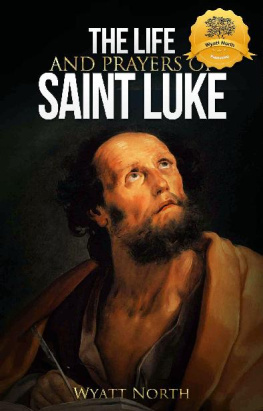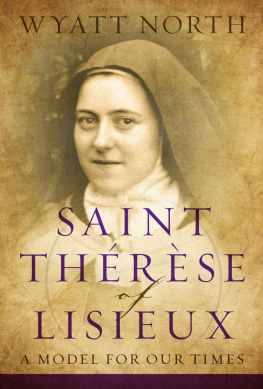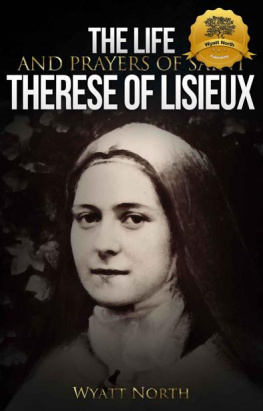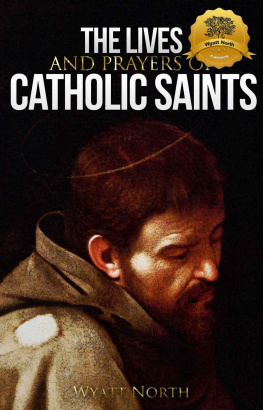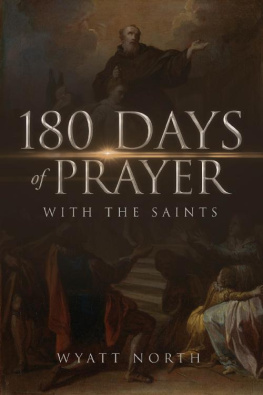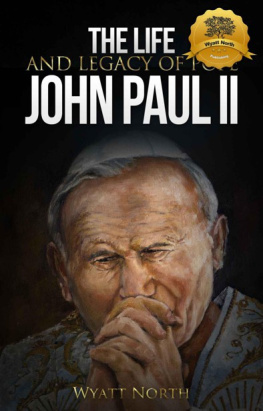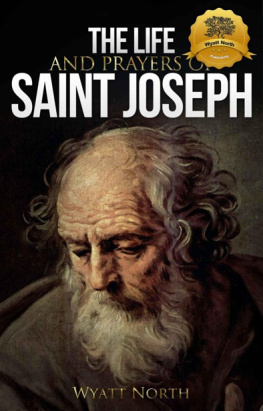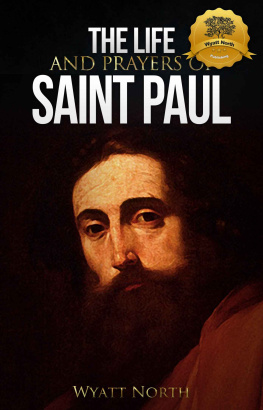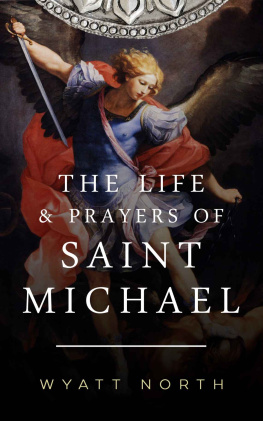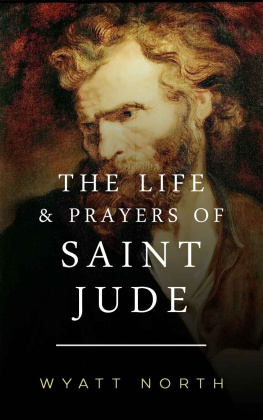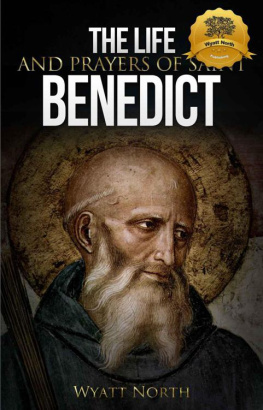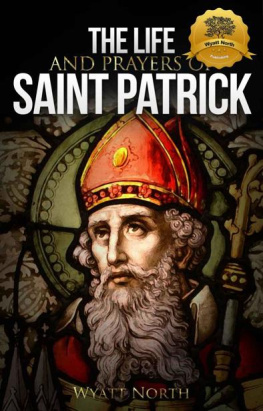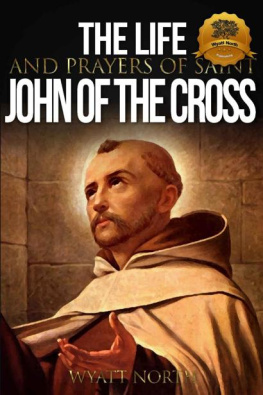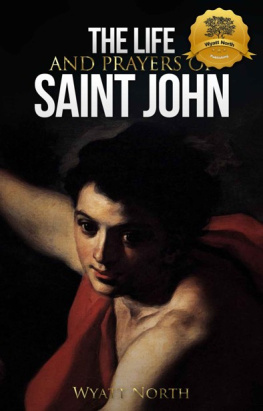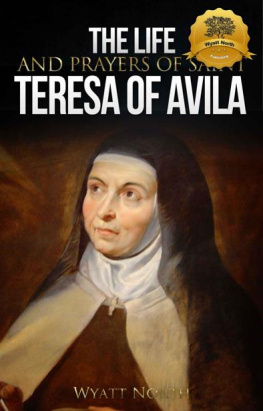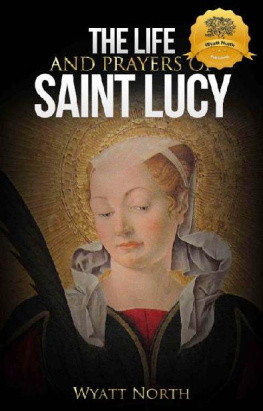Wyatt North - The Life and Prayers of Saint Luke
Here you can read online Wyatt North - The Life and Prayers of Saint Luke full text of the book (entire story) in english for free. Download pdf and epub, get meaning, cover and reviews about this ebook. year: 2013, publisher: CreateSpace Independent Publishing Platform, genre: Religion. Description of the work, (preface) as well as reviews are available. Best literature library LitArk.com created for fans of good reading and offers a wide selection of genres:
Romance novel
Science fiction
Adventure
Detective
Science
History
Home and family
Prose
Art
Politics
Computer
Non-fiction
Religion
Business
Children
Humor
Choose a favorite category and find really read worthwhile books. Enjoy immersion in the world of imagination, feel the emotions of the characters or learn something new for yourself, make an fascinating discovery.
- Book:The Life and Prayers of Saint Luke
- Author:
- Publisher:CreateSpace Independent Publishing Platform
- Genre:
- Year:2013
- Rating:3 / 5
- Favourites:Add to favourites
- Your mark:
- 60
- 1
- 2
- 3
- 4
- 5
The Life and Prayers of Saint Luke: summary, description and annotation
We offer to read an annotation, description, summary or preface (depends on what the author of the book "The Life and Prayers of Saint Luke" wrote himself). If you haven't found the necessary information about the book — write in the comments, we will try to find it.
The Life and Prayers of Saint Luke — read online for free the complete book (whole text) full work
Below is the text of the book, divided by pages. System saving the place of the last page read, allows you to conveniently read the book "The Life and Prayers of Saint Luke" online for free, without having to search again every time where you left off. Put a bookmark, and you can go to the page where you finished reading at any time.
Font size:
Interval:
Bookmark:

Publishing by Wyatt North Publishing, LLC. A Boutique Publishing Company.
Wyatt North and A Boutique Publishing Company are trademarks of Wyatt North Publishing, LLC.
Copyright Wyatt North Publishing, LLC. All rights reserved, including the right to reproduce this book or portions thereof in any form whatsoever. For more information please visit http://www.WyattNorth.com .
Cover design by Wyatt North Publishing, LLC. Copyright Wyatt North Publishing, LLC. All rights reserved.
Scripture texts in this work are taken from the New American Bible, revised edition 2010, 1991, 1986, 1970 Confraternity of Christian Doctrine, Washington, D.C. and are used by permission of the copyright owner. All Rights Reserved. No part of the New American Bible may be reproduced in any form without permission in writing from the copyright owner.
About Wyatt North Publishing
Wyatt North Publishing is a boutique publishing company. We always provide high quality, perfectly formatted, Books.
All of our eBooks include a Touch-or-Click Table of Contents, allowing easy and instant access to each section.
We guarantee our Books. If you are not 100% satisfied we will do everything in our power to make you happy. Visit .
Free eBooks
Never miss a free book from Wyatt North, and receive FREE inspirational eBooks for your eReader!
Thousands of readers have already joined. Sign up for free today.
Click here for free eBook offers!
Foreword
Nearly every detail about Luke the Evangelist's life has been the subject of heated debate. The scholars of one era have provided explanations that entirely contradict the scholars of an earlier era.
It is not as simple as a matter of religious tradition versus modern scholarship; tradition contradicts tradition, scholarship contradicts scholarship, scholarship contradicts tradition, and sometimes tradition and scholarship go hand in hand.
Despite the debate, no singular conclusion seems to be available. It does not help that more of Saint Luke's life is shrouded in darkness than is available to us, even when taking into account the most controversial suppositions about him.
That makes the quest for Saint Luke very difficult, but it is important that we try to find and to understand him nonetheless. He is, after all, a man whose work has influenced millions of people, and it is through him alone that we know several of the most popular parables of Jesus.
Quick Facts
The new Quick Facts section in The Life and Prayers series provides the reader with a collection of facts about each saint!
Born:
Antioch
Died:
c. 84, Boeotia
Feast:
October 18
Patronage:
Artists, physicians, surgeons, and others
The Life of Saint Luke
Introduction
The lives of the saints, written down over centuries long gone, are often filled with great detail of exploits and dialogue. The level of detail is not vast compared to what we are used to as moderns, but to the historian, familiar with documents of similar age, the details are extraordinary.
Sometimes the accounts are so detailed that it is hard to imagine that they were written purely historically, in the way that we write history today, without the aid of divine inspiration. We might then be forgiven if we assume that the authors of the New Testament are intimately known to us, perhaps not to us personally but to someone else. Their names and a sense of who they are has been passed down to millions of Christians for two millennia, from the modest believer to the Pope himself. Their images adorn churches the world over.
Yet, for all of the time that man has been spent studying their words, to better understand Christ's mission and the will of God, very little has been written about the people themselves. Even the evangelists, who can seem so near, are quite elusive. Of them, none is quite so elusive as Luke the Evangelist, the presumed author of both the Gospel of Luke and the Acts of the Apostles , the traveling companion of Saint Paul, the first painter of icons, and protector of doctors and artists.
Nearly every detail about Luke the Evangelist's life has been the subject of heated debate. The scholars of one era have provided explanations that entirely contradict the scholars of an earlier era. It is not as simple as a matter of religious tradition versus modern scholarship; tradition contradicts tradition, scholarship contradicts scholarship, scholarship contradicts tradition, and sometimes tradition and scholarship go hand in hand. Despite the debate, no singular conclusion seems to be available. It does not help that more of Saint Luke's life is shrouded in darkness than is available to us, even when taking into account the most controversial suppositions about him.
That makes the quest for Saint Luke very difficult, but it is important that we try to find and to understand him nonetheless. He is, after all, a man whose work has influenced millions of people, and it is through him alone that we know several of the most popular parables of Jesus. In our quest for Luke the Evangelist, however difficult it may sometimes be, we do not merely meet a saint, we also gain insights into gospels, the early Church, and the makings of the New Testament.
For two thousand years, countless of writers have made mention of Saint Luke. It would be impossible to enumerate them all, but most of the discussion has concerned the content of his writings, rather than the man himself. Even in those sources that concern themselves with Luke the Evangelist, the author, the physician, and the companion of Saint Paul, the information given is incredibly sparse. One can easily be misled into by the number of sources, for most of them are tremendously short. It is almost as if though to his contemporaries Saint Luke was not very important, merely the journalist reporting the story, and the men who later cared for the story of man himself then had very little contemporary source material to work with.
Luke's own writings, the Gospel of Luke and the Acts of the Apostles , are not forthcoming with details about their author, although some hints may be found in the saint's choice of phrasing and parables. Luke is also mentioned in passing in the letters of Saint Paul, specifically the Epistle to Philemon , the Epistle to the Colossians , and the Second Epistle to Timothy . The oldest source that deals with the life, and also death, of Saint Luke is an Anti-Marcionite Prologue . This is a collection of short introductory paragraphs about the gospel writers, composed between the late 2nd and late 4th centuries, and found in several dozen Latin bibles.
They are called anti-Marcionite because they exist for all evangelists except for Mark. The prologue about Luke is the oldest and was composed in Greek sometime in the late 2nd century, then amended with an extra paragraph in the 4th century. This means that some of the earliest information that we have on the life of Saint Luke was not written down until a full century after the end of his earthly life. Contemporary with the later changes of Luke's Anti-Marcionite Prologue are the writings of Eusebius of Caesarea, a Roman historian and Bishop of Caesarea northwest of Jerusalem. His famous Church History makes mention of Saint Luke and briefly verifies some of the traditions concerning Luke's home and profession. Eusebius was probably a source for the writings of Saint Jerome, who wrote a few decades later.
Jerome's Lives of Illustrious Men is a collection of biographical notices on famous men, and it contains a biography of Saint Luke consisting of a few short paragraphs. Saint Luke also appears in the In argumentum evangelii secundum Lucam of the 9th century Irish writer, Sedulius Scottus. Although its late date, the text probably reflects a much earlier tradition as Sedulius was primarily a compiler using earlier texts, such as the writings of Origen, a 3rd century theologian who wrote commentaries on Luke's gospel that now exists in fragments.
Next pageFont size:
Interval:
Bookmark:
Similar books «The Life and Prayers of Saint Luke»
Look at similar books to The Life and Prayers of Saint Luke. We have selected literature similar in name and meaning in the hope of providing readers with more options to find new, interesting, not yet read works.
Discussion, reviews of the book The Life and Prayers of Saint Luke and just readers' own opinions. Leave your comments, write what you think about the work, its meaning or the main characters. Specify what exactly you liked and what you didn't like, and why you think so.

